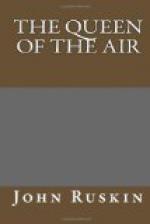34. But the most curious passage of all, and fullest of meaning, is when she gives strength to Menelaus, that he may stand unwearied against Hector. He prays to her: “And blue-eyed Athena was glad that he prayed to her, first; and she gave him strength in his shoulders, and in his limbs, an she gave him the courage”—of what animal, do you suppose? Had it been Neptune or Mars, they would have given him the courage of a bull, or a lion; but Athena gives him the courage of the most fearless in attack of all creatures, small or great, and very small it is, but wholly incapable of terror,—she gives him the courage of a fly.
35. Now this simile of Homer’s is one of the best instances I can give you of the way in which great writers seize truths unconsciously which are for all time. It is only recent science which has completely shown the perfectness of this minute symbol of the power of Athena; proving that the insect’s flight and breath are co-ordinated; that its wings are actually forcing-pumps, of which the stroke compels the thoracic respiration; and that it thus breathes and flies simultaneously by the action of the same muscles, so that respiration is carried on most vigorously during flight, “while the air-vessels, supplied by many pairs of lungs instead of one, traverse the organs of flight in far greater numbers than the capillary blood-vessels of our own system, and give enormous and untiring muscular power, a rapidity of action measured by thousands of strokes in the minute, and an endurance, by miles and hours of flight."*




